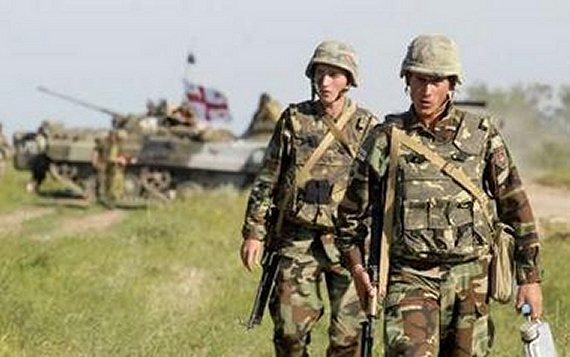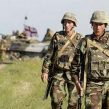
Georgia “Targeting” Military Operations in Afghanistan
Publication: Eurasia Daily Monitor Volume: 6 Issue: 138
By:

Georgia continues to contribute to international security, despite the threats the country is currently facing. The Georgian government will send a contingent of 100 military personnel by the end of 2009 to join the International Security Assistance Force (ISAF) in Afghanistan. In the near future the Georgian contingent will therefore reach 500. The 3rd Infantry brigade will represent Georgia in the NATO-led multinational operations in Afghanistan. The unit based in the Western Georgian city of Kutaisi, gained operational peacekeeping experience in Iraq during 2006-07 (www.interpressnews.ge, June 27).
The government is not expected to create any obstacle to the deployment of the military contingent to Afghanistan. The support in the Georgian parliament is guaranteed as the decision is welcomed not only by the ruling majority, but also by the parliamentary opposition as well. "This will facilitate the further deepening of our relations with our strategic partner the U.S., and in addition, it will partially fulfill the obligations which we have imposed according to the Charter on Strategic Partnership between the U.S. and Georgia," explained Nikoloz Laliashvili, a Christian-Democratic member of parliament (Medianews, June 30).
Some experts also believe that the participation of the Georgian military unit in Afghanistan involves other strategic dimensions. One independent expert, Irakli Sesiashvili, who is an ardent critic of the government told Radio Liberty that the Georgian military mission in Afghanistan will further facilitate Georgia’s Euro-Atlantic integration, since the operation in Afghanistan is led by NATO: "Besides, if we strive for NATO integration, we clearly need to cooperate with the military agencies from other countries in a coordinated manner, which will also contribute to increasing the prospects of our integration into NATO" (Pirveli, July 1).
According to Sesiashvili, the participation in real combat operations along with the military units of such powerful countries will enrich Georgian soldiers with substantive operational experience. In addition to that experience, Georgian serviceman will be able to meet the necessary management, organizational and operational requirements, which will also bring the Georgian army closer to the Alliance’s military standards, according to the strategic expert Tengiz Pkhaladze (Palitra Radio, June 29). However, he warns against falling under the illusion that the deployment of the Georgian military unit to Afghanistan will automatically resolve all the issues relating to the country’s security and Georgia-NATO relations: "Our participation in this operation is a small ring in the chain of Georgia’s Euro-Atlantic integration. However, to claim that our participation in this operation will lead the country into NATO tomorrow would naturally be an overestimation" (Palitra Radio, June 29).
This time the Georgian government is clearly avoiding much "hype." However, Tbilisi is clearly displaying the desire to impress its allies. Based on information on the website of the Georgian MoD, in the fall one company from the Georgian armed forces will be sent to Afghanistan to participate in the NATO-led ISAF. By 2010, the Georgian contingent will practically triple in number, and will reach the level of a battalion. In fact, Georgia will then outnumber other NATO members, like: Hungary, Slovakia, Greece, Slovenia, Croatia, Albania and the Baltic States.
Irakli Aladashvili, a Georgian military expert suggests that the government must clearly explain why it should send 500 military personnel to Afghanistan when Georgia’s internal security is under potential threat: "Every soldier should be in his own country and serve its interests if aggression takes place. Hence, we request that our government, if it takes such steps despite the existing threat, also thinks about ensuring political guarantees to mitigate the risk" (Arsenali, June 29).
To what extent can the participation of the Georgian company or even a battalion in the NATO-led military operation in Afghanistan serve as a firm guarantee that Russia will subsequently refrain from carrying out a new military aggression? Georgia has been involved in NATO operations in the Balkans for nine years, and for five years in Iraq, along with the U.S. and other NATO members. This contribution to international security did not prevent Russian aggression in August 2008 and the current Russian occupation of its territories (www.pressa.ge, June 26). Sending the Georgian contingent to Afghanistan will not serve as a stronger security guarantee, according to Archil Gegeshidze, a Georgian strategic expert. Though Gegeshidze is convinced that this is one of the major steps in gaining significant diplomatic support, he explained: "Georgia has no other means left. It should be as close to the West as possible. Today, Georgia’s stability and security solely depend on external political security. Hence, for this political support to increase, we should not fail to express our loyalty to the West" (RFE/RL, June 29).
Georgia has proven its loyalty to the West by its actions since 1999. More than 10,000 military personnel have participated in peacekeeping operations first in Kosovo, then in Iraq and briefly in Afghanistan during 2005-06; five Georgian soldiers died in these operations, while nearly twenty servicemen were injured. By the end of this year, the Georgian contingent will join a French brigade in peace support operations in Afghanistan. The Georgian battalion will also be deployed on an American military base.




